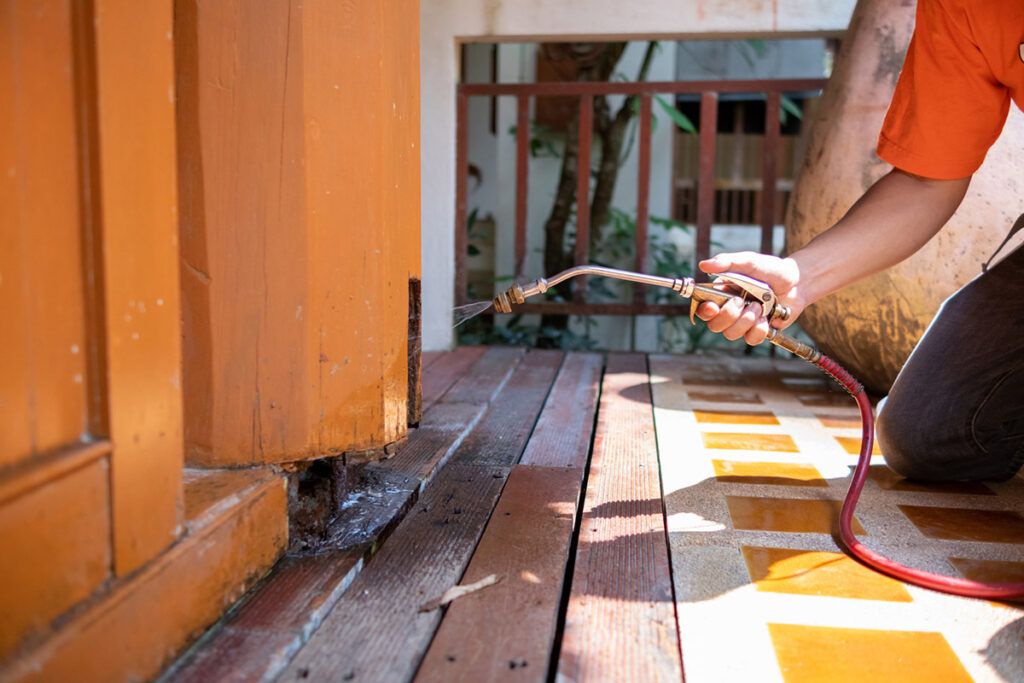What Is a Termite Bond?

Termites are one of the most destructive pests that plague our homes. If you notice signs of an infestation, the time to take action is now. According to the United States Department of Agriculture (USDA), termites cause roughly $5 billion in damage each year. Getting ahead of this alarming trend is an important step that many homeowners should take.
If you know you live in an area that’s prone to termite activity you may consider proactive measures like buying a termite bond. With a termite bond, you’ll be taking a wise first step in pest control to take care of potential problems before they get out of hand.
What Is a Termite Bond?

A termite bond is not a form of insurance, though it acts in a similar way as an insurance policy. With a bond like this, the homeowner (or it could be a property manager or the homebuilder) pays a certain amount of money to a licensed pest control company. In exchange, the home will receive services to prevent and treat termite damage or repair any damage that’s already taken place.
These contracted services can be made by filing a claim against the bond or by contacting the company you hold the bond with. It’s worth noting that claims may result in higher premiums the following term. Most people will purchase these bonds from a pest control company, but you also may be able to buy a termite bond surety from an insurance provider depending on where you live.
The specific details of your bond will vary based on the terms you agree to, but can often include:
- Regular inspections (usually annual)
- Use of preventative products around the property
- Treating active termite populations and infestations
- Retreatments when needed
- Repairing structural damage done by termites
Types of Termite Bonds
There are two main types of termite bonds, transferable and non-transferrable, and within these two groups, you’ll find other subcategories that define the exact type of coverage that’s included.
Transferable bonds
A transferable bond can be passed from one person to another upon the sale of a home. These are most commonly purchased by a home builder or a home seller who plans to transfer the bond over to the new seller once the transaction is complete.
By doing so, the seller (or home builder) ensures the property has been inspected and treated by professionals to address any termite activity and that the structure of the home and the land beneath it is safe from an infestation.
Non-transferable bonds
As the name implies, a non-transferable bond cannot be passed from one person to another and only stays with the homeowner who initially purchased it. If the homeowner goes on to sell their house, the new owner would have to purchase an entirely new bond to maintain termite coverage.
Both transferable and non-transferable termite bonds can be customized depending on the needs of the homeowner, how much they can afford on their premium, and what terms are offered by the pest control company. There are four main areas of coverage:
- Prevention bonds: This type of bond only covers preventative measures for termite protection and typically cannot be used if there’s a known active infestation.
- Treatment bonds: A treatment bond will cover the cost of termite treatment (and often retreatment), but only if an infestation occurs.
- Repair bonds: A repair bond will cover the costs to repair termite damage to the home’s structure, but it doesn’t cover treatment or prevention services. Note that some homes may not qualify for a repair bond due to the high costs incurred by the issuer, so be sure to ask your pest control company if this option is available.
- Prevention, treatment, and repair bonds: You may be able to purchase a bond that includes all three components for comprehensive coverage that includes prevention, treatment, and repairs.
How Much Does a Termite Bond Cost?
| Cost Factor | Details |
|---|---|
| Initial Inspection Fee | Ranges from $500 to $2,000 |
| Yearly Warranty Cost | Typically between $300 and $400 annually |
| Location of Home | Affects cost due to varying termite activity by region |
| Type of Structure | Wooden homes are more vulnerable and may incur higher costs |
| Scope of Coverage | Can include inspection, prevention, treatment, repairs |
| Transferability of Bond | Transferable vs non-transferable impacts cost |
| Term Length | Duration of the bond term affects pricing |
| Repair vs. Treatment Bonds | Repair bonds are more expensive due to potential damage |
Several factors will affect how much you’ll end up paying for a termite bond, including where your home is located, the type of structure (with homes made of wood being the most vulnerable to termites), and the scope of coverage that your bond assures (for instance does it include inspection, prevention, treatment, and repairs or just one of these). Additional costs are based on whether your bond is transferable or non-transferable, and the length of the bond term.
Most termite bond costs are broken up into two parts: a fee for the initial inspection followed by a yearly warranty for the ongoing treatment and prevention services. The average cost for the initial inspection can range anywhere from $500 to $2,000 and the yearly warranty will cost you on average $300 to $400. Repair bonds can also be substantially more expensive than treatment bonds since termites can inflict serious damage to the structure of a home.
How Long Does a Termite Bond Last?
The length of a termite bond will vary depending on your contract, but on average you will have to renew your bond every year. Some bonds may have terms that last two to three years, but this should be made clear when you receive a quote from a pest control company.
Does Homeowners Insurance Cover Termite Damage?
Typically, homeowners insurance doesn’t cover this type of service since termite infestation and damage done by termites is almost always considered a “preventable” issue. Homeowners insurance is designed to cover unforeseen or accidental damage such as a hurricane that rips out a section of your roof, a frozen pipe that bursts and floods your basement, or loss of property due to theft.
However, since in the eyes of your insurance provider, you can (and should be) taking steps to prevent termites from entering your property in the first place, this type of damage will not fall under the usual coverage. Some companies may offer termite insurance as a rider that you can add to your existing policy, but this is fairly rare.
When You Need a Termite Bond

Not everyone will need or want to purchase a termite bond, but there are a few key situations where you should consider getting one. If you’re in one of the following categories, you should seriously weigh the pros and cons of buying a termite bond:
Termite Bonds for Homebuilders
Termite bonds are very popular with homebuilders, especially those operating in the South where termites are seen much more frequently. It’s in the best interest of the homebuilder to ensure the new property is free from any defects or liabilities that could lower the sales price, hold up a sale, or worse – result in legal action by the new homeowner who discovers an issue only after the sale has closed.
Because of this, a homebuilder may choose to purchase a transferable termite bond that can be passed along to the new owner as a form of insurance and guarantee that they’ve done their due diligence to ensure the land and new construction are free from termite activity.
Termite Bonds for Homebuyers and Sellers
Anytime you’re buying or selling a home, you want to do everything you can to make sure the transaction goes smoothly and that all parties stay in full compliance with the law. As a home seller, you are legally obligated to disclose any known defects or hazards that could affect the value of the home and many states require disclosure of pest activity which includes termites. All pests, but termites especially, can cause extensive damage to a home and since many termites are subterranean (meaning they live underground) they can be hard to detect until it’s too late.
One step a home seller can take to attract buyers is to purchase a termite bond so potential buyers know the home has been inspected and has guaranteed coverage should any termite activity pop up. Alternatively, a home buyer may wish to purchase a termite bond at closing on a new home if they’re unsure whether there’s been termite activity as a safeguard for damage they may not know about. Additionally, if you wish to buy a house that has known termite damage your lender may require you to have a termite bond as a condition of your mortgage.
Termite Bonds for Areas with High Termite Activity
Some parts of the country are much more prone to termite infestation than others, and the most inundated areas are in the Southern States. This is for a couple of reasons. The weather is typically warmer year round with a higher humidity in the South, which is the ideal environment for termites to thrive. There are also more structures made of wood in this part of the country, which is a termite’s favorite food source.
If you’re unsure of the likelihood you’ll see termites at your home based on where you live, you can consult the Termite Infestation Probability Map. This map splits the country into four sections of termite infestation: none to slight, slight to moderate, moderate to heavy, and very heavy. If you live in one of the areas with moderate or heavy termite activity, you should be prepared to take a more rigorous approach to keeping termites at bay and a termite bond is a good way to do this. For these homeowners, keeping an active termite bond for as long as they plan on living in the home can end up saving them thousands of dollars in the long run.
Is a Termite Bond a Waste of Money?
Like choosing any insurance policy, you’re taking a gamble by not protecting your property and a termite bond may give you the peace of mind you need to feel relaxed and not worry about tapping into your savings account when you unexpectedly encounter termite damage. That said, it does cost money and you may decide that you can better use these funds elsewhere.
If you are considering purchasing a termite bond, try to get quotes from at least three different companies so you can compare rates and coverage options from multiple reputable businesses. You should also ask friends and neighbors who live in the area about their experience with termites and ask if they have any pest control tips or recommendations for termite bond companies.
The best pest control companies will offer you upfront and transparent information about their pricing structure and services, so there should be no hidden fees or surprise costs involved. Many of the most well-known pest control businesses offer these services, and you can find out more by reading about the best pest control companies. Start with our Orkin or Terminix review to see if they may be an option for you.